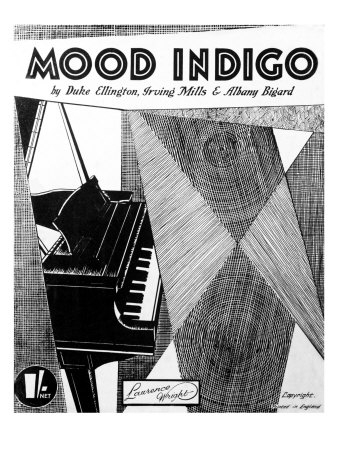 I went at Mood Indigo: A Life of Duke Ellington with hammer and tongs last week, and by the time I was done, I’d written the first 16,000 words of the fifth chapter, which will take Ellington from 1929 to 1933.
I went at Mood Indigo: A Life of Duke Ellington with hammer and tongs last week, and by the time I was done, I’d written the first 16,000 words of the fifth chapter, which will take Ellington from 1929 to 1933.
Appropriately enough, one of the things that I wrote was a discussion of “Mood Indigo” itself. I especially like this paragraph:
Ellington is said to have thought “Old Man Blues” to be his best composition yet. It’s easy to see why he was so pleased with it, but “Mood Indigo,” recorded two months later by a seven-piece combo drawn from the band, is even more inspired, and unlike “Old Man Blues,” which was rarely heard in later years, it became a permanent and beloved part of the band’s working repertoire. A nocturne whose “exquisitely tired and four-in-the-morning” atmosphere (in Constant Lambert’s phrase) he would evoke time and again, “Mood Indigo” opens with a three-part chorale intoned by muted trumpet, muted trombone, and low-register clarinet, the same combination that André Previn had in mind when he marveled at how “Duke merely lifts his finger, three horns make a sound, and I don’t know what it is.” Then Barney Bigard steps out from the ensemble to play the tune, a rich and shapely melody backed by the tick-tock strokes of Freddy Guy’s banjo and the smooth, steady walk of the rest of the rhythm section. Arthur Whetsel plays a delicate solo and Ellington flutters gracefully through a lacy four-bar piano interlude, after which the chorale is repeated as the record spins to a close. Two months later the full band re-recorded “Mood Indigo,” but Ellington knew better than to tamper with the scoring of the introductory chorale. It is as simple–and unforgettable–as a proverb.
I’m feeling good about the book again. Can you tell?
* * *
A Snader Telescriptions film of “Mood Indigo” performed by the Ellington orchestra in 1951. The clarinet solo is by Jimmy Hamilton. The arrangement, by Billy Strayhorn, is significantly different from the one described above:
Paul Newman and Sidney Poitier “play” “Mood Indigo” in the 1961 film Paris Blues. Newman’s trombone was dubbed by Murray McEachern. The onscreen pianist is Aaron Bridgers, Billy Strayhorn’s first lover:
